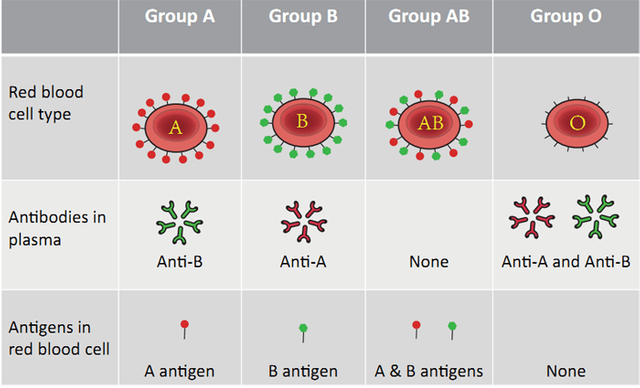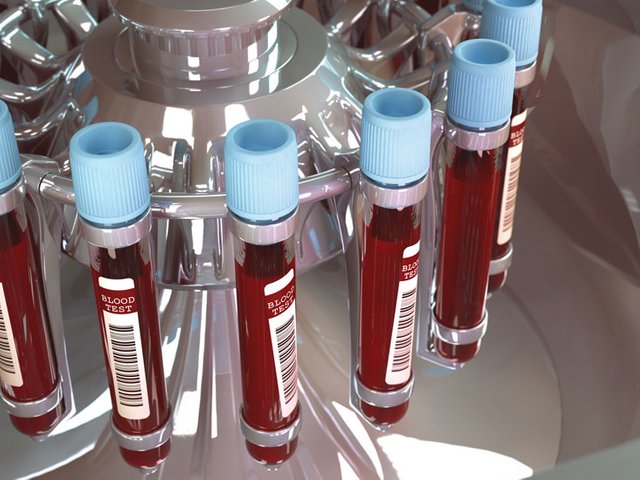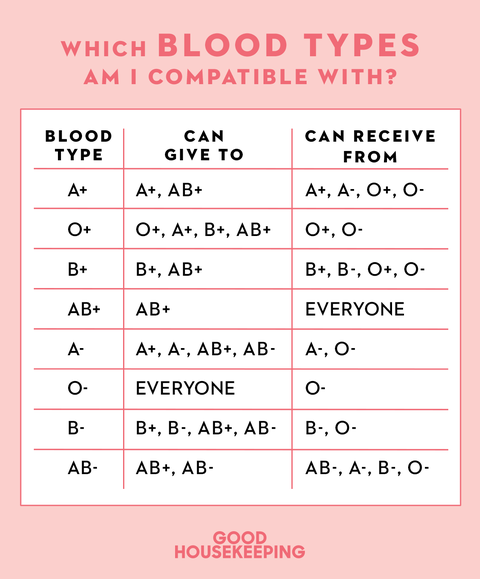Blood type is passed down to you from your parents.
There are a lot of combinations that can be made — just because your parents have the same blood type doesn’t mean you’ll have that one, too. For example, parents who both have Type O will always pass on their own blood type. However, parents who both have Type B can have a child with either Type O or B, and parents who both have Type A can have a child with either Type O or A. A combination of Type A and Type B can lead to any blood type.

Source
Most of the time, the purpose of blood typing is to know who you can safely donate blood to or receive blood from. But your blood type may also put you at risk for certain medical conditions. Here are three ways your blood type and your health may be connected:
- Heart Attack and Heart Disease
It may seem obvious that your blood type is related to your heart, since your heart pumps blood to the rest of your body. But your blood type can actually put you at a higher risk for conditions such as heart attack and heart disease.
This is because of a gene called the ABO gene — a gene that’s present in people with A, B, or AB blood types. The only blood type that doesn’t have this gene is Type O.
If you have the ABO gene and you live in an area with high pollution levels, you may be at a greater risk of heart attack than those who don’t have the gene.
The ABO gene can also increase your risk of coronary artery disease (CAD). CAD develops when the arteries that supply blood to and from your heart harden and narrow — which can cause a heart attack if they become blocked.”
What You Can Do if You’re at Risk
Just because you have the ABO gene doesn’t mean heart complications are inevitable. There are ways to avoid further increasing your risk:
Stay out of highly polluted areas and exercise indoors.
Maintain a heart-healthy diet by eating fruits, vegetables, whole grains, fish, and nuts.
Get regular exercise.
Avoid smoking.
Get regular physical exams to monitor your heart health, which keeps you and your doctor informed about any warning signs of heart problems.
- Brain Function and Memory Loss
The ABO gene is connected with brain function and memory loss. People who have blood types A, B, and AB are up to 82 percent more likely to develop cognition and memory problems — which can lead to dementia — compared to those with Type O.
One possible reason for this memory loss is the fact that blood type can lead to things like high blood pressure, high cholesterol, and diabetes. These conditions can cause cognitive impairment and dementia.
Blood type has been connected with stroke, too, which can occur when the blood flow to the brain is disrupted.
What You Can Do if You’re at Risk
There are ways to keep your cognitive function strong:
Get regular exercise.
Avoid too much stress.
Try to get 7 to 9 hours of sleep each night.
See your physician regularly to catch early signs of dementia.
- Cancers
There are plenty of factors that have been connected with a higher risk of cancer, and it can sometimes be hard to know which ones to look into more seriously than others. However, people with Type A blood have been found to have a higher risk of stomach cancer specifically, compared to those with other blood types.
The ABO gene may play a role with a heightened cancer risk, as well. This gene has been connected to other cancers, including lung, breast, colorectal, prostate, liver, and cervical cancers.
This correlation has been studied for more than 60 years, and while research continues to show a correlation, there is no definitive explanation as to why the ABO gene may put you at a higher risk for some cancers.
What You Can Do if You’re at Risk
While you may not be able to change your blood type, there are ways to lower your risk of cancer:
Eat a healthy diet of fruits, vegetables, whole grains, fish, and poultry.
Get regular exercise.
Avoid smoking.
Though there are no sure ways to prevent cancer, these actions can help lower your risk and keep you healthy.
What Does This Mean for Your Health?
Your blood type is just one factor that contributes to your risk for certain health conditions.
“While your blood type may put you at a higher risk for certain conditions, nothing is definitive. Being aware of how your blood type may impact your health is a good start, but it’s also just as important to see your physician for regular check-ups and maintain a healthy.
Many people don’t know their blood type. Even if you do know your type, you might not realize that the type might make you more prone to certain medical conditions.
Your blood type is a way to categorize your blood according to what’s in it: antigens, including the Rhesus, or Rh, factor.

Source
Antigens are a type of protein on red blood cells. Based on the type of antigen, your blood will be categorized as Type A, Type B, Type AB, or Type O. “When antigens come into contact with substances that are unfamiliar to your body, such as certain bacteria, they trigger a response from your immune system. The same type of response can occur during a blood transfusion if your donor’s blood type doesn’t match with yours


You've got a free upvote from witness fuli.
Peace & Love!
Downvoting a post can decrease pending rewards and make it less visible. Common reasons:
Submit
@fuli I really appreciate .. thanks so much ❤️
Downvoting a post can decrease pending rewards and make it less visible. Common reasons:
Submit